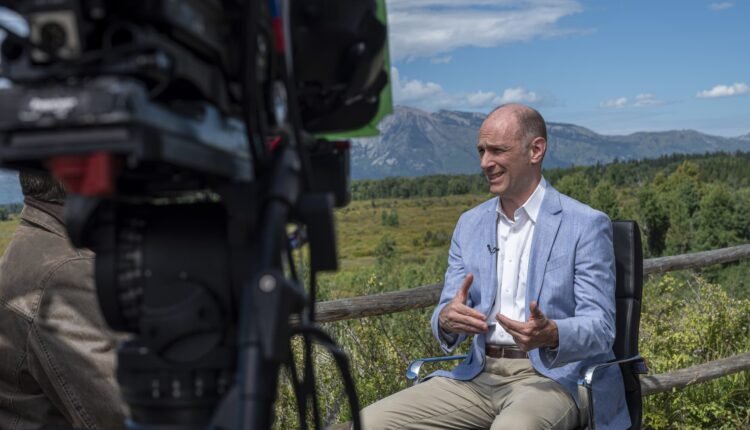[ad_1]
People walk by the New York Stock Exchange (NYSE) on November 02, 2023 in New York City.
Spencer Platt | Getty Images News | Getty Images
This report is from today’s CNBC Daily Open, our new, international markets newsletter. CNBC Daily Open brings investors up to speed on everything they need to know, no matter where they are. Like what you see? You can subscribe here.
What you need to know today
A fierce winning streakU.S. stocks rose Tuesday to hit fresh winning streaks, their longest in three years. But Asia-Pacific markets were mixed Wednesday. Japan’s Nikkei 225 ticked down 0.1% despite rising confidence among large Japanese manufacturers, according to a Reuters Tankan survey. Meanwhile, Australia’s S&P/ASX 200 climbed 0.2% a day after the country’s central bank raised rates by 25 basis points.
Microsoft closes at a highMicrosoft shares climbed 1.12% to hit $360.53, a record high. It’s the eighth consecutive day in which the technology giant’s shares rose, a streak unseen since January 2021. Investors cheered Microsoft CEO Satya Nadella’s surprise appearance at OpenAI’s event, where he encouraged developers to build with Microsoft’s Azure cloud infrastructure.
‘Absolutely booming’ Chinese sectorChina’s economy hasn’t recovered from its pandemic blues. But in the sectors of “electric vehicles and everything around sustainability and renewable power technology,” China is “absolutely booming,” Standard Chartered CEO Bill Winters told CNBC. Relatedly, China’s truck industry is increasingly using vehicles with assisted-driving technology, a critical step toward monetizing the nascent business.
Peak, not pause?The U.S. Federal Reserve, European Central Bank and the Bank of England all paused interest rate hikes in recent weeks. This breather comes after dramatic hikes over the last 18 months as central banks grappled with unruly inflation. Some market watchers, in fact, think this lull in hikes isn’t so much a pause but the peak in rates — and are turning their attention to when central banks will start cutting.
[PRO] Buy BYDOver the past 18 months, Warren Buffett’s Berkshire Hathaway has sold more than half its stake in Chinese electric vehicle maker BYD, according to stock filings. Despite that, analysts still think BYD’s a stock worth buying — and some even raised their price targets for the firm.
The bottom line
Last month’s sudden surge in Treasury yields and oil prices — both of which tend to suppress investors’ appetite for stocks — looks to be ending. No, scratch that — the increases aren’t just ending, they’re ebbing.
Look at oil: Contracts for both West Texas Intermediate and Brent futures fell around $3. WTI’s now at $77.01 a barrel while Brent’s $81.44, their lowest since July. That’s almost $10 per barrel less compared with a month ago, when prices jumped on fears triggered by the Israel-Hamas conflict.
Meanwhile, the 10-year Treasury yield fell around 10 basis points to 4.569% and the 2-year yield slipped 3 basis points to 4.915%. As Treasury yields serve as the benchmark for interest rates on loans and cash investments, sinking yields generally benefit rate-sensitive companies more. In other words: the Magnificent Seven Big Tech. Amazon led the pack, shooting up 2.13% yesterday.
That explains why the Nasdaq Composite jumped 0.9%, more than the S&P 500’s 0.28% gain and the Dow Jones Industrial Average’s 0.17% increase. Still, that’s not downplaying the movements. The S&P and Dow are enjoying their seventh consecutive session of gains, while the Nasdaq’s basking in its eighth.
If the U.S. Federal Reserve does indeed steer the economy to a soft landing, in which inflation is contained below 2% without the economy contracting, then there could be a further rally in stocks, said HSBC. Within periods of soft landings, the S&P has jumped, on average, 22% in the space between a pause and six months after rate cuts begin, noted HSBC’s global equity strategist Alastair Pinder.
And that immaculate disinflation isn’t just a dream. Chicago Federal Reserve President Austan Goolsbee told CNBC, “Because of some of the strangeness of this moment, there is the possibility of the golden path … that we got inflation down without a recession.”
Both the economy and markets have truly acted in strange, unprecedented ways ever since the pandemic. From one of the worst years for stocks and bonds in 2022, to a widely heralded bull rally in the S&P — and then a correction — in 2023. And I haven’t even started on the U.S. labor market and inflation numbers. Strange may be new and unsettling, but it isn’t necessarily bad.
[ad_2]
Source link



